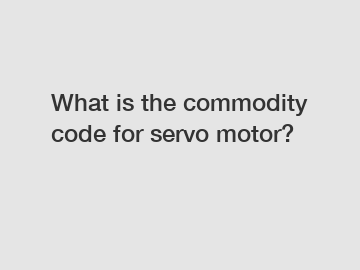What is the commodity code for servo motor?
What is the commodity code for servo motor?
In the world of industrial automation, servo motors play a crucial role. These high-performance motors offer precise control of motion, making them indispensable in a wide range of applications. However, when it comes to international trade, it becomes important to classify products correctly using commodity codes. A commodity code, also known as a Harmonized System (HS) code, is an internationally recognized system used to classify traded goods. But what is the commodity code for a servo motor? Let's delve into this topic and explore why it is essential to know the correct code for these motors.
1. Understanding the Commodity Code System:

The Harmonized System is a nomenclature developed by the World Customs Organization (WCO) to classify goods in international trade. It consists of a code with up to ten digits, providing detailed information about the characteristics of a product. Commodity codes are used for various purposes, including customs declaration, statistical analysis, and tariff determination.
2. Servo Motors and their Classification:
Servo motors are considered electro-mechanical devices that provide precise control over motion in industrial applications. They are often classified under HS code 8501, which refers to electric motors and generators. However, it is important to note that HS codes can vary slightly among different countries or regions. Therefore, it is advisable to consult the specific classification of the target market for accurate trade purposes.
3. Importance of Accurate Classification:
Accurately classifying goods using the appropriate commodity code is vital for several reasons. Firstly, customs authorities require correct classification to determine the applicable customs duties and taxes. Incorrect classification can lead to delays in clearance, penalties, or even legal issues. Secondly, proper classification helps in statistical analysis, enabling governments and organizations to gather accurate data on imports and exports. Lastly, it ensures fair competition among businesses by preventing misclassification or misdeclaration of goods.
4. Determining the Commodity Code for Servo Motors:
Additional resources:Demystifying OCR25AL5: Unveiling its Intricate Applications!
The Ultimate Guide to Duplex Stainless Steel Pipe Price
Why is there a Ductile iron pipe shortage?
Which Surprising Applications Can Stainless Steel Blind Flanges Revolutionize?
Which Corrosion Resistant Wire Mesh Enhances Durability?
How do they make graphite molds?
The Ultimate Guide to UHP Graphite Electrode
While servo motors are generally classified under HS code 8501, it is crucial to consult the specific classification guidelines of the destination country or region. The local customs authority or a trade expert can provide the necessary guidance. Additionally, some countries offer online databases or resources to assist in determining the commodity code for various products, making the classification process more accessible.
5. Expert Assistance and Consulting:
Given the complexity and variations in commodity codes, seeking expert assistance or consulting a trade professional is highly recommended. These professionals possess the knowledge and experience required to navigate the intricate world of international trade classification. They can help with accurate commodity code determination, ensuring compliance with regulations and avoiding any potential trade disputes.
6. Continuous Monitoring and Upgrades:
The classification of products, including servo motors, is subject to periodic updates and amendments. It is important for businesses involved in international trade to stay informed about any changes in commodity codes. Regularly monitoring updates from customs authorities or trade organizations helps in maintaining compliance and avoiding any unforeseen issues during shipment.
7. Implications of Incorrect Classification:
Failing to classify goods correctly can have significant consequences. Apart from delays and penalties, an incorrect commodity code may lead to inappropriate customs duties being applied, resulting in financial losses for importers or exporters. Moreover, misclassification can impact trade agreements, as tariff rates are often determined based on specific commodity codes.
In conclusion, accurate classification of servo motors and other goods using correct commodity codes is of utmost importance in international trade. With their vital role in industrial automation, servo motors must be classified under the appropriate HS code to ensure compliance and seamless cross-border transactions. Consulting experts, staying updated on latest regulations, and relying on reliable resources are essential steps towards accurate classification, avoiding pitfalls, and preserving the integrity of international trade.
If you are looking for more details, kindly visit Precast Concrete Magnet Box, Precast Concrete Magnet, External Threaded Rubber Coated Pot Magnet.
Additional resources:What happens if you drill through gas pipe?
Sleep Easy with the Ultimate Reno Mattress
Simple Installation Guide for Stainless Steel Screens: A Hassle-Free Solution for Heat & Privacy
What are the advantages of purchasing a space truss for your business?
What are the advantages of nichrome wire?
Is Magnetic Shuttering Solution Worth the Investment for B2B Buyers?
The Ultimate Guide to Tungsten Carbide Drill Rods
256
0
0
Related Articles
-
183
0
0
-
184
0
0
-
208
0
0
-
181
0
0
-
200
0
0
-
177
0
0
-
Ultimate Guide to High Bulk Density Graphite
If you're looking for high bulk density graphite, you've come to the right place!
200
0
0
-
188
0
0









Comments
All Comments (0)